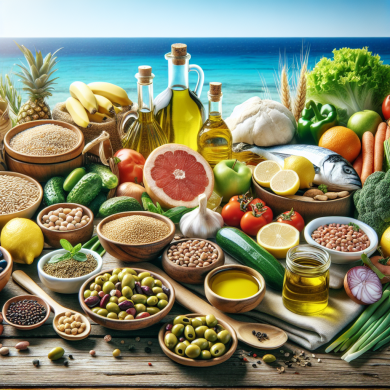Top Healthy Fats in Mediterranean Diet
The Mediterranean diet is lauded for its heart-healthy benefits, vibrant flavors, and holistic approach to nourishment. Central to this diet is the incorporation of healthy fats, which play a crucial role in supporting cardiovascular health, brain function, and overall wellness. In this article, we will delve into the top healthy fats that form the cornerstone of the Mediterranean diet, exploring their benefits, sources, and how you can incorporate them into your daily meals.
Olive Oil: The Liquid Gold
Olive oil, often referred to as “liquid gold,” is the quintessential fat in the Mediterranean diet. Rich in monounsaturated fats, particularly oleic acid, olive oil has been associated with numerous health benefits, including reduced inflammation and a lower risk of heart disease. Its high antioxidant content, including polyphenols, contributes to its protective effects.
Benefits of Olive Oil
- Heart Health: Olive oil helps lower LDL (bad) cholesterol levels while maintaining or raising HDL (good) cholesterol levels, promoting heart health.
- Anti-inflammatory Properties: The antioxidants in olive oil, such as oleocanthal, act as natural anti-inflammatory agents.
- Rich in Antioxidants: Olive oil contains powerful antioxidants that protect cells from oxidative damage.
Incorporating Olive Oil
To incorporate olive oil into your diet, use it as a primary cooking fat, drizzle it over salads, or use it as a dip for bread. Opt for extra virgin olive oil for maximum health benefits, as it is the least processed form and retains the most nutrients.
Avocados: Creamy and Nutritious
Avocados are another excellent source of healthy fats in the Mediterranean diet. They are rich in monounsaturated fats, fiber, and essential vitamins and minerals. The creamy texture of avocados makes them a versatile ingredient in a variety of dishes.
Benefits of Avocados
- Heart Health: The monounsaturated fats in avocados help reduce bad cholesterol levels and support overall cardiovascular health.
- Rich in Nutrients: Avocados are packed with vitamins such as vitamin K, E, C, and B vitamins, as well as potassium and magnesium.
- Fiber Content: They are a good source of dietary fiber, promoting digestive health and increasing satiety.
Incorporating Avocados
Add avocados to your salads, blend them into smoothies, or simply enjoy them on toast. Their rich, buttery flavor complements a wide range of dishes, making them an easy addition to your Mediterranean-inspired meals.
Nuts and Seeds: Small but Mighty
Nuts and seeds are integral components of the Mediterranean diet, known for their healthy fat content and nutrient density. Almonds, walnuts, chia seeds, and flaxseeds are just a few examples that offer a range of health benefits.
Benefits of Nuts and Seeds
- Heart Health: Nuts and seeds are rich in omega-3 fatty acids, which are beneficial for heart health.
- Protein and Fiber: They provide a plant-based source of protein and are high in fiber, aiding in digestion and promoting fullness.
- Antioxidants and Micronutrients: These include essential vitamins, minerals, and antioxidants that support overall health.
Incorporating Nuts and Seeds
Sprinkle nuts and seeds over salads, yogurt, or oatmeal. Enjoy them as a snack or incorporate them into homemade granola bars for a nutritious boost.
Fatty Fish: Omega-3 Powerhouse
Fatty fish such as salmon, sardines, and mackerel are staples in the Mediterranean diet due to their high omega-3 fatty acid content. These essential fats are known for their numerous health benefits, particularly for heart and brain health.
Benefits of Fatty Fish
- Heart Health: Omega-3 fatty acids help reduce inflammation, lower blood pressure, and decrease triglyceride levels.
- Brain Health: They play a crucial role in brain function and development, potentially reducing the risk of cognitive decline.
- Rich in Vitamins D and B2: Fatty fish are excellent sources of vitamin D and B2, supporting bone health and energy production.
Incorporating Fatty Fish
Incorporate fatty fish into your diet by grilling, baking, or steaming them. Aim to consume fish at least twice a week to reap the full benefits of omega-3 fatty acids.
Conclusion
The Mediterranean diet’s emphasis on healthy fats, such as olive oil, avocados, nuts, seeds, and fatty fish, is a key contributor to its renowned health benefits. These fats provide essential nutrients, support cardiovascular health, and add rich flavors to a wide variety of dishes. By incorporating these healthy fats into your diet, you can enjoy the delicious and nourishing aspects of the Mediterranean lifestyle while promoting long-term health and well-being.















Add comment